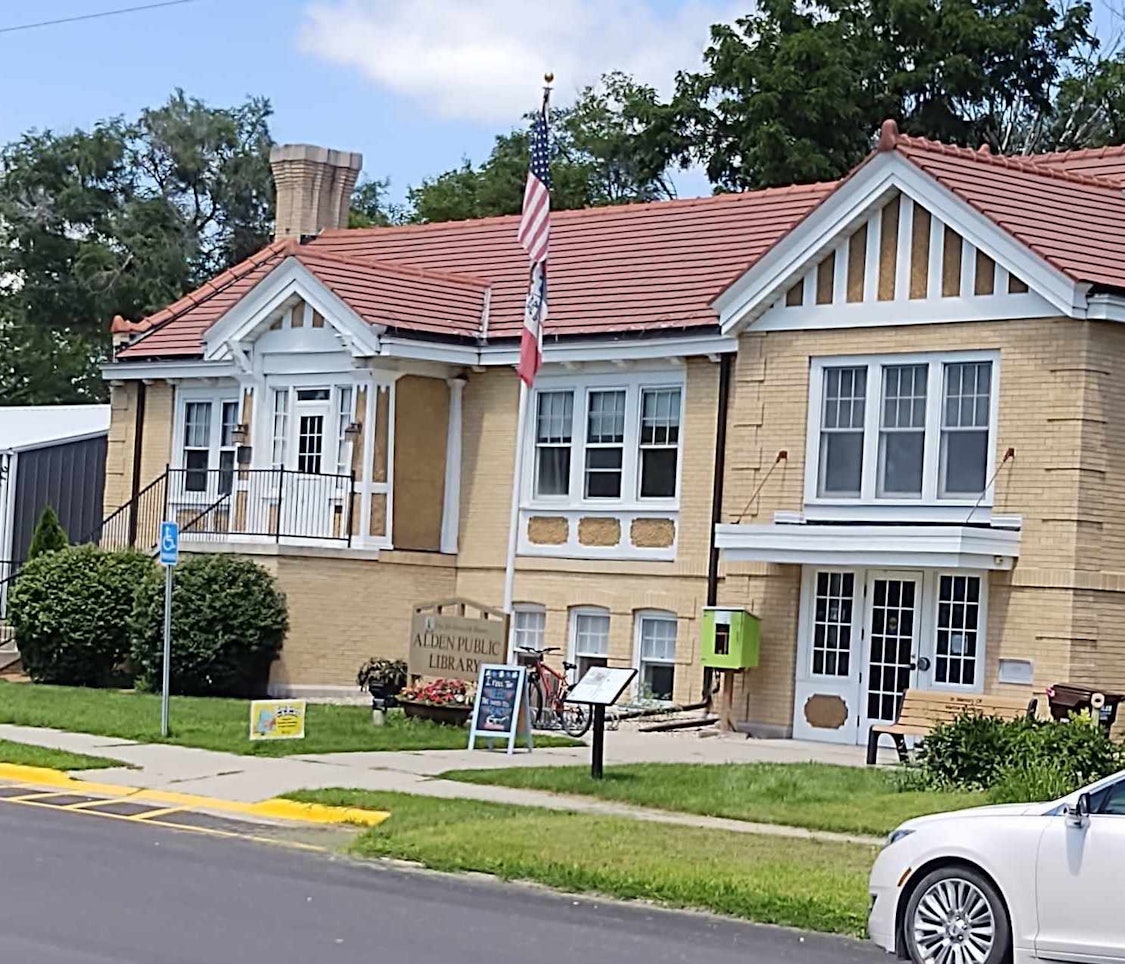
Photo by Bruce Lear of the public library in Alden, Iowa.
UPDATE: None of the bills that threatened to undermine the independence of public libraries made it past the Iowa legislature’s first “funnel” deadline on February 16. Original post follows.
Bruce Lear lives in Sioux City and has been connected to Iowa’s public schools for 38 years. He taught for eleven years and represented educators as an Iowa State Education Association regional director for 27 years until retiring. He can be reached at BruceLear2419@gmail.com
Most Iowa towns have a few things in common: a gas station, a bar, a sprinkling of different church flavors, and a public library.
Now, almost all of Iowa’s 500 public libraries are governed by a board of trustees. The library trustees make policy and oversee the collection. They are volunteer boards that function independently but are appointed by city councils.
That all could change if House Study Bill 678 becomes law.
This bill would allow city councils to override decisions made by library boards and would strike down provisions in state law which require voter approval before changing the governance of public libraries.
My gloom and doom legislative predictions don’t always come true. But this one did. In an October article about Pella attempting to get voter approval for the changes outlined in this bill, I predicted, “During the next legislative session, GOP lawmakers may use this local controversy to go a step further by forcing this change statewide and destroying library board local control.”
On November 7, Pella citizens were asked to change the governance of their library. Those who pushed for the referendum were angry the adult section of the library had Gender Queer: A Memoir by Maia Kobabe available.
I spent four years in Pella before graduating from Central College. It’s a beautiful community, and Central College is a wonderful small college. It’s conservative. In his “Over the Coffee” column for the Des Moines Register, Donald Kaul once called Pella, “Tehran without veils.”
I wouldn’t go that far, but I would say Pella is a small town with about 30 churches and three bars. In the 1970s, the only business open on Sunday was George’s Pizza. George defied unwritten rules. Pella may not be Orange City conservative, but you might think twice about mowing your lawn on Sunday.
When these conservative voters were asked to allow the city council to run the library instead of a board of trustees, 51 percent voted no. Even in a town with bedrock conservative values, voters recognized this change was a bad idea.
House Study Bill 678 is just another attempt to control ideas Republicans don’t like. It’s a sequel to Senate File 496, passed last year with only Republican votes. That law stipulated that school libraries and classrooms may only contain “age-appropriate” materials,” and further said age-appropriate “does not include any material with descriptions or visual depictions of a sex act” as defined in a separate code section. The bill’s floor manager was State Senator Ken Rozenboom, who represents Pella.
In December, U.S. District Cout Judge Stephen Locher blocked the state from enforcing the book ban provisions of Senate File 496, calling the language “incredibly broad” and “unlikely to satisfy the First Amendment under any standard of scrutiny.”
The majority party needs to remember they once preached small government. Here are a few other reasons to let this bill die:
- House Study Bill 678 is a backdoor attempt to regulate ideas by making the governance of libraries political.
- It’s government overreach at its worst. Libraries should be a repository of many ideas, even ideas rejected by partisan politicians of either party.
- City councils have enough things to worry about like city streets, sewers, and building codes. They have neither the time nor the inclination to decide on library collections.
- Library trustees are appointed by the city council so elected officials do have a say on who governs the library. The trustees are people interested in the library. That’s why they applied to be on the board.
- This bill is trying to solve local issues with a statewide law. But if a city council has a disagreement with a library board, those two entities can reconcile differences through honest conversation. This is a solution in search of a problem.
The legislature should be focused on real problems like hunger, mental health access, and affordable health care. Leave public libraries alone. They’re doing just fine.
Editor’s note from Laura Belin: State Representative Carter Nordman, who chaired the subcommittee that advanced House Study Bill 678, has denied the Pella vote inspired the legislation. He told Bleeding Heartland on February 8, “This was brought by some city administrators. It had nothing to do with the Pella referendum.” He claimed the purpose of the bill is to give city governments more control over management issues, like “the personnel and taxpayer dollars being used.”
Republicans on an Iowa Senate subcommittee advanced a different bill, Senate Study Bill 3168, on February 12. That bill would leave some code language on local referendums intact but would allow city councils to “oversee and change the practice related to hiring a library director and utilize moneys collected pursuant to section 8A.222 by ordinance and without a referendum.”
Almost all the members of the public who spoke about the new Senate bill in subcommittee opposed it.

1 Comment
let's be clear
that the governance of public institutions is inherently political so the question isn’t a matter of making something political or not but who gets to make these decisions and on what basis?
Ideally people on such a board would have some relevant knowledge that any random elected official wouldn’t and this would then be another case of undermining expertise which is the larger theme of these issues of reactionary attacks on librarians and teachers (related to campaigns against medical professionals, scientists, etc) .
dirkiniowacity Tue 13 Feb 5:04 PM